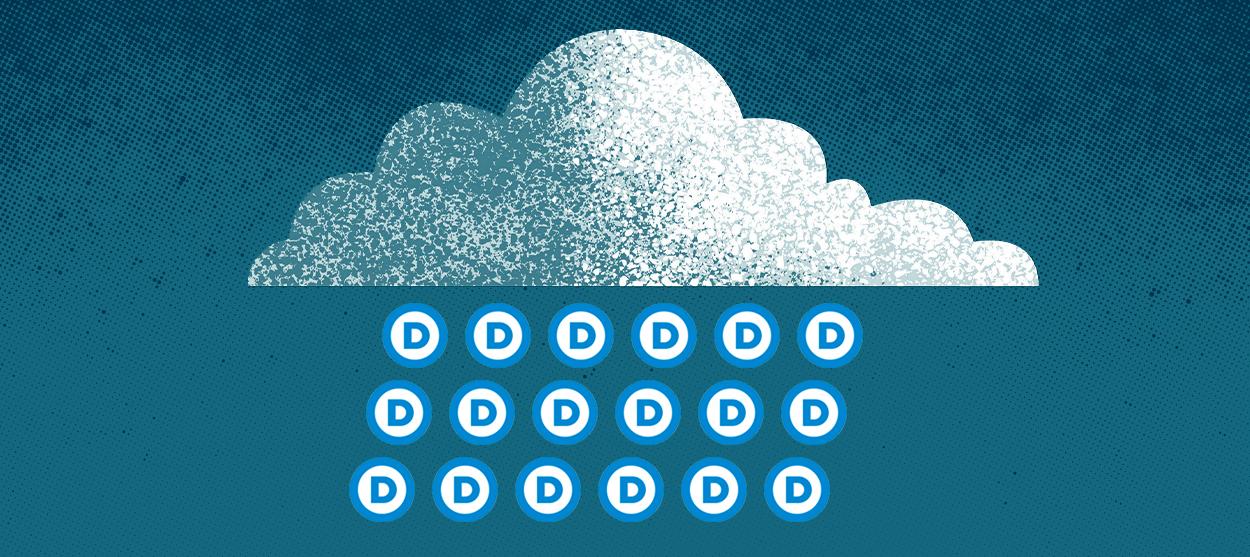How rain could decide the Senate and the fate of a Biden presidency
The partisan divide over mail-in voting means Election Day turnout is more important than ever


A free daily email with the biggest news stories of the day – and the best features from TheWeek.com
You are now subscribed
Your newsletter sign-up was successful
Which party will win the 2020 elections and what does that mean for America's future? Pundits are in overdrive trying to predict the possible outcomes of campaign strategies, policy platforms, advertising, the courts, voter suppression, and a host of other factors. But the reality is that fate might be out of the candidates', or anyone else's, hands.
Control of the United States Senate, and therefore the direction of a whole host of issues ranging from immigration reform to health care to the minimum wage, could come down to whether it rains on Election Day.
Research shows that bad weather can meaningfully reduce turnout on Election Eay. According to one famous study of presidential elections from 2007, "rain significantly reduces voter participation by a rate of just less than 1 percent per inch, while an inch of snowfall decreases turnout by almost .5 percent."
The Week
Escape your echo chamber. Get the facts behind the news, plus analysis from multiple perspectives.

Sign up for The Week's Free Newsletters
From our morning news briefing to a weekly Good News Newsletter, get the best of The Week delivered directly to your inbox.
From our morning news briefing to a weekly Good News Newsletter, get the best of The Week delivered directly to your inbox.
Normally, the partisan impact from this slight decrease is very modest and could only theoretically make a difference in extremely close races, but this year is truly unique. Between fears of contracting COVID-19 and President Donald Trump repeatedly making baseless claims about the legitimacy of vote by mail, there is for the first time a massive partisan divide in voting patterns. While in the past Democrats and Republicans tended to vote in person on Election Day, early in person, and by mail at similar rates, this year is completely different.
For example, in Arizona, the CBS/Yougov poll found just 7 percent of Democrats plan to vote in person on Election Day while that is how 32 percent of Republicans plan to vote. Similarly, in North Carolina, the New York Times/Siena poll found only 28 percent of Democrats are planning to vote in person on Election Day compared to 52 percent of Republicans. In Georgia, a Quinnipiac poll found a massive 14 percent to 44 percent partisan divide on in-person Election Day voting.
Bad weather on November 3, therefore, has the potential to noticeably hurt Republicans. While Joe Biden's polling lead is currently so large it is unlikely a weather-related shift in turnout will change the dynamics of the presidential race, it could decide control of the Senate. There are several Senate races — including Georgia, South Carolina, North Carolina, Iowa, Michigan, and Montana — where at least one recent poll found the candidates separated by two points or less. In those races even a modest weather effect could make a deciding difference.
For example, in Georgia, if the partisan breakdown in expected Election Day voters holds true and total turnout is similar to 2016, a 2 percent across-the-board decrease in Election Day voting would cost Republicans a net of roughly 11,000 votes. That is about the size of the 10,033-vote margin which decided the critical 2018 Florida Senate race and the 11,576 vote margin in the 2012 Nevada Senate race, and it's much larger than the 312 votes that decided the 2008 Minnesota Senate race that gave Democrats a critical 60th seat in the Senate. For comparison, Georgia's 2018 gubernatorial race was decided by only 54,732 votes.
A free daily email with the biggest news stories of the day – and the best features from TheWeek.com
Weather on Election Day could be the difference between Democrats winning full control of the federal government or Biden needing to deal with a Republican Senate to do almost anything. That would likely crush any hope of Biden making good on promises ranging from massive new pandemic stimulus packages, to health care reform, to a minimum wage increase. Democrats have a decade-long backlog of plans and proposals which would mostly be scrapped if they fail to get the Senate.
Almost as important is the margin by which Democrats take the Senate. A Biden first term in which Democrats need Sen Joe Manchin (D-W.V.) to be the 50th vote on everything is going to be pretty limiting compared to one where the party needs to only convince one of several moderate Democrats to be the 50th vote.
If Joe Biden really wants to save the soul of America, he should start praying for rain.
Jon Walker is the author of After Legalization: Understanding the Future of Marijuana Policy. He is a freelance reporter and policy analyst that focuses on health care, drug policy, and politics.
-
 Is Andrew’s arrest the end for the monarchy?
Is Andrew’s arrest the end for the monarchy?Today's Big Question The King has distanced the Royal Family from his disgraced brother but a ‘fit of revolutionary disgust’ could still wipe them out
-
 Quiz of The Week: 14 – 20 February
Quiz of The Week: 14 – 20 FebruaryQuiz Have you been paying attention to The Week’s news?
-
 The Week Unwrapped: Do the Freemasons have too much sway in the police force?
The Week Unwrapped: Do the Freemasons have too much sway in the police force?Podcast Plus, what does the growing popularity of prediction markets mean for the future? And why are UK film and TV workers struggling?
-
 The billionaires’ wealth tax: a catastrophe for California?
The billionaires’ wealth tax: a catastrophe for California?Talking Point Peter Thiel and Larry Page preparing to change state residency
-
 Bari Weiss’ ‘60 Minutes’ scandal is about more than one report
Bari Weiss’ ‘60 Minutes’ scandal is about more than one reportIN THE SPOTLIGHT By blocking an approved segment on a controversial prison holding US deportees in El Salvador, the editor-in-chief of CBS News has become the main story
-
 Has Zohran Mamdani shown the Democrats how to win again?
Has Zohran Mamdani shown the Democrats how to win again?Today’s Big Question New York City mayoral election touted as victory for left-wing populists but moderate centrist wins elsewhere present more complex path for Democratic Party
-
 Millions turn out for anti-Trump ‘No Kings’ rallies
Millions turn out for anti-Trump ‘No Kings’ ralliesSpeed Read An estimated 7 million people participated, 2 million more than at the first ‘No Kings’ protest in June
-
 Ghislaine Maxwell: angling for a Trump pardon
Ghislaine Maxwell: angling for a Trump pardonTalking Point Convicted sex trafficker's testimony could shed new light on president's links to Jeffrey Epstein
-
 The last words and final moments of 40 presidents
The last words and final moments of 40 presidentsThe Explainer Some are eloquent quotes worthy of the holders of the highest office in the nation, and others... aren't
-
 The JFK files: the truth at last?
The JFK files: the truth at last?In The Spotlight More than 64,000 previously classified documents relating the 1963 assassination of John F. Kennedy have been released by the Trump administration
-
 'Seriously, not literally': how should the world take Donald Trump?
'Seriously, not literally': how should the world take Donald Trump?Today's big question White House rhetoric and reality look likely to become increasingly blurred
